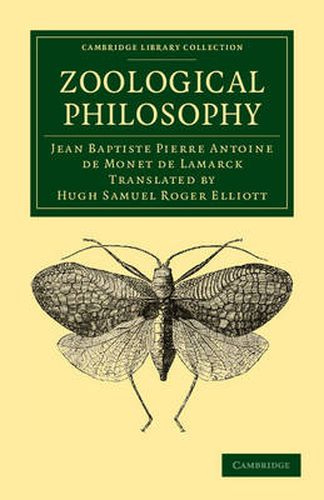Readings Newsletter
Become a Readings Member to make your shopping experience even easier.
Sign in or sign up for free!
You’re not far away from qualifying for FREE standard shipping within Australia
You’ve qualified for FREE standard shipping within Australia
The cart is loading…






The great French zoologist Lamarck (1744-1829) was best known for his theory of evolution, called ‘soft inheritance’, whereby organisms pass down acquired characteristics to their offspring. Originally a soldier, Lamarck later studied medicine and biology. His distinguished career included admission to the French Academy of Sciences (1779), and appointments as Royal Botanist (1781) and as professor of zoology at the Musee Nationale d'Histoire Naturelle in 1793. Acknowledged as the premier authority on invertebrate zoology, he is credited with coining the term ‘invertebrates’. In this 1809 work, translated into English in 1914, he outlines his theory that under the pressure of different external circumstances, species can develop variations, and that new species and genera can eventually evolve as a result. Darwin paid tribute to Lamarck as the man who ‘first did the eminent service of arousing attention to the probability of all change … being the result of law’.
$9.00 standard shipping within Australia
FREE standard shipping within Australia for orders over $100.00
Express & International shipping calculated at checkout
The great French zoologist Lamarck (1744-1829) was best known for his theory of evolution, called ‘soft inheritance’, whereby organisms pass down acquired characteristics to their offspring. Originally a soldier, Lamarck later studied medicine and biology. His distinguished career included admission to the French Academy of Sciences (1779), and appointments as Royal Botanist (1781) and as professor of zoology at the Musee Nationale d'Histoire Naturelle in 1793. Acknowledged as the premier authority on invertebrate zoology, he is credited with coining the term ‘invertebrates’. In this 1809 work, translated into English in 1914, he outlines his theory that under the pressure of different external circumstances, species can develop variations, and that new species and genera can eventually evolve as a result. Darwin paid tribute to Lamarck as the man who ‘first did the eminent service of arousing attention to the probability of all change … being the result of law’.